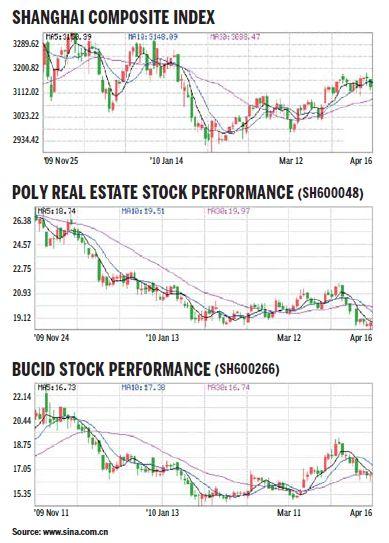BEIJING - Li Xinran, a 26-year-old investor in Beijing bet three times on A-share property stocks, only to end up with losses as the shares' value continue to decline.
"They say that you should be greedy when others are fearful. But that doesn't seem true for property stocks," Li said.
The weak performance of property shares has cost him a more than 10 percent loss and Li said he would stay away from property stocks in the short term.
The rampant rise in housing prices in China's major cities sharply contrasts with the share prices of listed developers.
The property stock gauge has declined about 10 percent this year, one of the worst-performers on the benchmark Shanghai Composite Index.
The share price of China Vanke Co Ltd, the country's largest property developer by market value, has declined by 15 percent this year although the company reported a 32 percent profit growth in 2009.
Despite a short-lived recovery in property stocks earlier this month, few investors now expect to profit from a sustainable rebound amid concerns of more policy tightening.
Many investors like Li have simply left the sector. The government has repeatedly warned about inflation risks and pledged to rein in the run-away housing prices as figures showed property prices continued to soar.
Property prices in 70 of China's large and medium-sized cities rose 11.7 percent year on year, up from the 10.7 percent in February, the fastest pace in two years. Analysts said that it is still too early for bargain buys of property stocks as policy tightening remains the biggest risk in the market.
"Although the market is supported by good news including the better performance of developers and growing expectations of the yuan's appreciation, ultimately it has to look to policy for future direction," said Ren Jin, an analyst at Huatai United Securities. "The property sector has hit a new low but whether it is the prelude to rebound or a deeper decline remains to be seen," he said.
China's Shanghai Stock Exchange Composite Index fell the most in three weeks after the Chinese government announced measures to cool the real-estate market last week. The measures stipulate new down payment requirements for mortgages on second homes.
The index fell 1.1 percent on Friday on concern the government will increase new measures to curb property speculation to slow economic growth. Stock-index futures rose on the first day of trading.
The statement, released by the State Council on Saturday, said commercial banks can refuse to issue loans to buyers of their third home in areas suffering from excess property price rises. To curb speculation, banks can also halt loans to those who can't provide documents to prove they had lived and paid taxes and social insurance for at least one year in cities where they intended to buy houses, according to the statement.
"These are the harshest measures targeting the property market we have seen recently," said Wu Kan, a Shanghai-based fund manager at Dazhong Insurance Co, which oversees $285 million. But other market watchers said the current valuations of the property stocks already reflect policy risks and room for a deeper fall is limited.
"The negative policy impact is factored into the current valuations of property stocks. The market will consolidate itself as it is looking for a new price boost. Opportunities may arise after the government's policy tone becomes certain," said Zheng Qingping, an analyst at Tebon Securities.
Xinhua contributed to the story.






